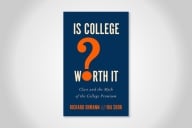You have /5 articles left.
Sign up for a free account or log in.
Lately I feel like I’ve been punched in the gut—like that friend I always stood up for just proved everyone else right and made me look like a fool.
I’m talking about the media.
And though I’m using hyperbole, it’s not an inaccurate metaphor. The media has always been that friend I’ve defended, and recently I’ve found myself with fewer arguments to make in its favor.
Campus media relations professionals spend nearly as much time promoting their institutions to the media as they do promoting the media to their faculty, staff and students. Getting people to trust the media is hard, and the past year and a half has proven particularly difficult. Caught up in an unprecedented presidential election, news outlets have been slammed for unfair coverage (sometimes rightly, and noted by their own ombudspeople), and have even been hijacked by propagandists who leave Americans confused and disillusioned. All of this has created a shift in how PR staffers do our work, and it’s hard to predict what will happen next or how we will have to defend our work and our colleagues in the media.
I am a staunch supporter of the media and dutifully defend the role of journalists. It’s their job to ask questions you might not like. And, it’s not their job, nor is it in the best interest of the public, to get drafts of articles approved by interview subjects. I believe our free press is one of the most important freedoms we have as Americans, and I’ve tried to get others to think about and appreciate this freedom as well.
It’s not easy to convince skeptical academics to talk with the media and often I’m the lone voice siding with a reporter after a negative (though accurate) story is published. Taking this unpopular stance was particularly difficult at the start of my career when I was often the youngest person in the room and I defended the media and used the opportunity to explain how the piece came about. But I did it, and I have never regretted it because I believe in the necessity of unbiased journalism and its importance to a democracy, even if coverage isn’t ideal.
To be clear, I still hold the industry and the vast majority of journalists in high regard. But I’ve been let down—and I suspect many journalists feel this way themselves. Some of this feeling comes from the hijacking of news, and has more to do with criminal behavior than the actual news media. I’m talking about fake news (real fake news), social media bots and other interference in what information Americans see and the validity of those posts. It’s a huge problem, and though some action has been taken there is still much to be done on this front. In the meantime, we’re navigating uncharted waters as a nation, adding a layer of complexity to how PR professionals do our jobs.
Even without fake news from Russia, there are issues from within that are problematic. Just yesterday morning, I read about the Koch brother’s involvement in the sale of Time Inc. to Meredith Corp. There was a time I would have shrugged off their political interests, certain that their investment would not have influence on editorial decisions. But after all that’s happened in politics and media in the past year, I have to admit I am a little uneasy about the news.
Monday morning also brought more news about Charlie Rose, a trusted voice over the years, being stripped of awards and honorary degrees for sexual misconduct.
All of this disheartening to say the least. It’s also confusing. Although it is starting to wear some of us out and there are strong arguments against working with the media, it is time to double down. We must acknowledge the landscape is not perfect and do more to celebrate the good players. We must educate ourselves—and our campuses—on how to identify fake news and we must offer training that takes into account the shifting media landscape including political leanings of certain outlets, the role of social media in news sharing and the new pressures journalists face.
Finally, we must be proactive. If we, the cheerleaders for the media, are feeling weary, imagine how others must be feeling. For the sake of our profession, and for all the journalists who do their jobs right, it is a particularly important time to snap out of our funk and adopt some new and strategic methods for working smartly with, and for, the media.








